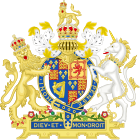Ship Money Act 1640
Appearance
| Act of Parliament | |
 | |
| Long title | An Act for declaring unlawfull and void the late proceedings touching Ship money and for vacating of all Records and Processe concerning the same.[2] |
|---|---|
| Citation | 16 Cha. 1. c. 14 |
| Dates | |
| Royal assent | 7 August 1641 |
| Other legislation | |
| Amended by | Statute Law Revision Act 1888 |
| Repealed by | Statute Law (Repeals) Act 1969 |
Status: Repealed | |
| Text of statute as originally enacted | |
The Ship Money Act 1640 (16 Cha. 1. c. 14) was an Act of the Parliament of England.[3] It outlawed the medieval tax called ship money, a tax the sovereign could levy (on coastal towns) without parliamentary approval. Ship money was intended for use in war, but by the 1630s was being used to fund everyday government expenses of King Charles I, thereby subverting Parliament.
The whole Act, so far as unrepealed, was repealed by section 1 of, and Part I of the Schedule to, the Statute Law (Repeals) Act 1969.
Section 2
[edit]This section, from "it is" to first "aforesaid" was repealed by section 1 of, and Part I of the Schedule to, the Statute Law Revision Act 1888.
See also
[edit]- R v Hampden (1637) 3 Howell State Trials 825
- Ship money
References
[edit]- ^ The citation of this Act by this short title was authorised by section 5 of, and Schedule 2 to, the Statute Law Revision Act 1948. Due to the repeal of those provisions, it is now authorised by section 19(2) of the Interpretation Act 1978.
- ^ These words are printed against this Act in the second column of Schedule 2 to the Statute Law Revision Act 1948, which is headed "Title".
- ^ "Ship Money Act". British History Online. 1640. Archived from the original on 4 November 2012.
